Rebekah Sharpe is one of our Journalists for Dear Fathers, and a truly beautiful vessel of a woman in so many recognized aspects. Along with her intentional ministry in sharing the stories of our fathers, she is also the co-host of Sharpe Talk with her dad, NFL Pro-Bowler Luis Sharpe. Luis Sharpe played 13 seasons in the NFL for the St. Louis/Phoenix/Arizona Cardinals (1982-1994), and also played for the Memphis Showboats in 1985.
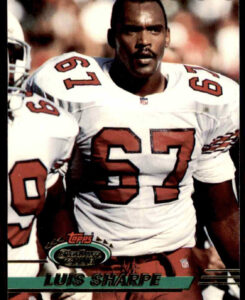
Rebekah categorizes the Sharpe Talk as a transformative moment to experience healing in the relationship between her and her dad, as well as tapping into the hope in their relationship to see how God touches people with their relationship.
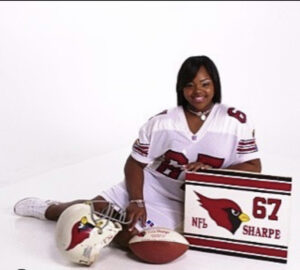
The Sharpe Talk started with Rebekah and her father, but it has now expanded to several of his former teammates as well. Their five principles are Faith, Fun, Family, Football, and Friendship. Rebekah sees this as a monumental ministry to bring to life the “legacy work” that her dad started when she was just a baby. Both Rebekah and her dad seek to put intentional prayer behind the purpose of the talk to truly make an impact on all who listens. Rebekah mentioned that she wanted to work to get her dad into the NFL Hall of Fame, and her dad would remind her—
“I’m already in the Hall of Fame.”
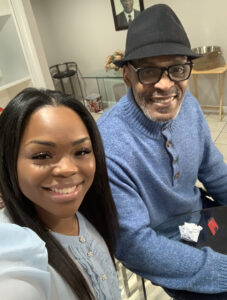
Growing up With Dad
Rebekah reflects that her dad was initially present in her life, as he would pick her up from school, participate in father-daughter dances, welcoming new siblings in the world, and upholding the Cuban traditions of her family with strength.
When Rebekah was eight years old, her family went through subsequent obstacles as her parents divorced, and Luis Sharpe endured a career-ending injury. From this, his addiction increased, and it led to him getting arrested. Rebekah recalls the feeling upon her knowing that everyone in Phoenix knew this happened because of how famous he was. Because of this, people would not come around them because they considered him deranged. He interacted with “odd” people, became unstable, and seemingly dysfunctional at the time. This was emotionally “scary” for Rebekah because her dad was going through his own journey of addiction.
During this season, her dad was in and out of jail, which changed her reality from sitting at the dinner table together to phone calls and visits to jail and prison. This shaped Rebekah’s relationship with him moving forward as for a short period, she almost forgot that he was a rising star in the community—instead, she saw the person who brought pain, disappointment, and shame. When Rebekah needed a father, he wasn’t there, and if he was, it was a negative contribution because of his addiction. The Arizona Republic released an article titled, “From Football Hero to Crackhead Zero”, which caused a fallout between Rebekah and her father due to the continuous ridicule from the supporting community. This led to a summer family visit to Michigan in which Rebekah did not return home to Phoenix from.
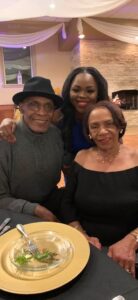
The Transformation of the Trials
Rebekah’s undeniable strength and faith has led her to extract such positive and life-changing principles from the troubles that her dad endured. Rebekah recalls that while her dad was in prison, he found Christ. When he wrote letters to Rebekah, it had a biblical undertone. This instilled and planted the seed of the unwavering faith residing in Rebekah today. This gravitated her to want more of God and made her more of a God-fearing woman each day. She is confident that God has His intentional hand on this entire journey to not only block the overwhelming shame, pain, and disappointment, but to have the ability to count it all joy and see the sovereignty of God in it all. She has been led to walk in authority and courage, help people in their personal journey, and reflect the bright and shining light that is within her from Christ—especially through her smile and personality. She has a specific heart for those who have journeyed through incarceration, drugs, and addiction, and reflects empathy based on the experiences she has endured. Rebekah is affirmed that the years of pain and trials yield real power and testimony.
“God comforts us in times of troubles to then comforts others.”
Rebekah is enlightened for having a renewed mind throughout this journey. She is reminded that this isn’t a moment to lament, but an opportunity to serve in meaningful ways. She learned how to transition her mind from being caught up in brokenness and procrastination to be lifted in the truth that we had to go through our healing journey and forgive to truly minister to others. This resonated most through two of Rebekah’s friends losing their fathers in 2020. It ignited a reflection that we aren’t promised long lives to make amends with things, so instead we need to seize the moment (“for such a time as this”). It’s still uncomfortable, but Rebekah is willing to be uncomfortable for the purpose of God.
“Nothing is going to be 100% perfect, but if I am going to give God my ‘yes’, then I’m going to give it my all.”
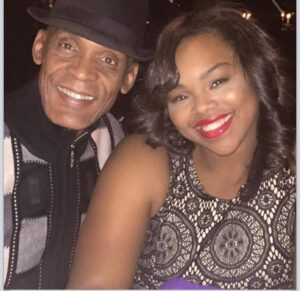
Negative Narratives Around Black Fathers
Rebekah mentioned five narratives about black fathers that have caused harm or misconception within the community:
1)They are always absent.
2)They don’t care about their children.
3)They are incarcerated or in the grave.
4)They are weak and not able to provide for their families.
5)They are not able to be a lover for their wives, or a positive example for their children.
Rebekah is excited that there are reframed narratives of real stories and real men who prioritize fatherhood and navigate their way through it while capturing the resilience, strength, and beauty of black fatherhood.
“There are so many things coming against black fatherhood, so that’s how you know it’s a beautiful thing because no one would challenge if it wasn’t powerful.”
Dear Father,
“Thank you for conquering giants on and off the field, never giving up on yourself, and for being a hero, even throughout all your issues and circumstances—you are my hero. Thank you. Thank you for never giving up. Your latter is greater than your former.”
Told you–a beautiful vessel.
To keep up with Rebekah Sharpe and the Sharpe Talk:





